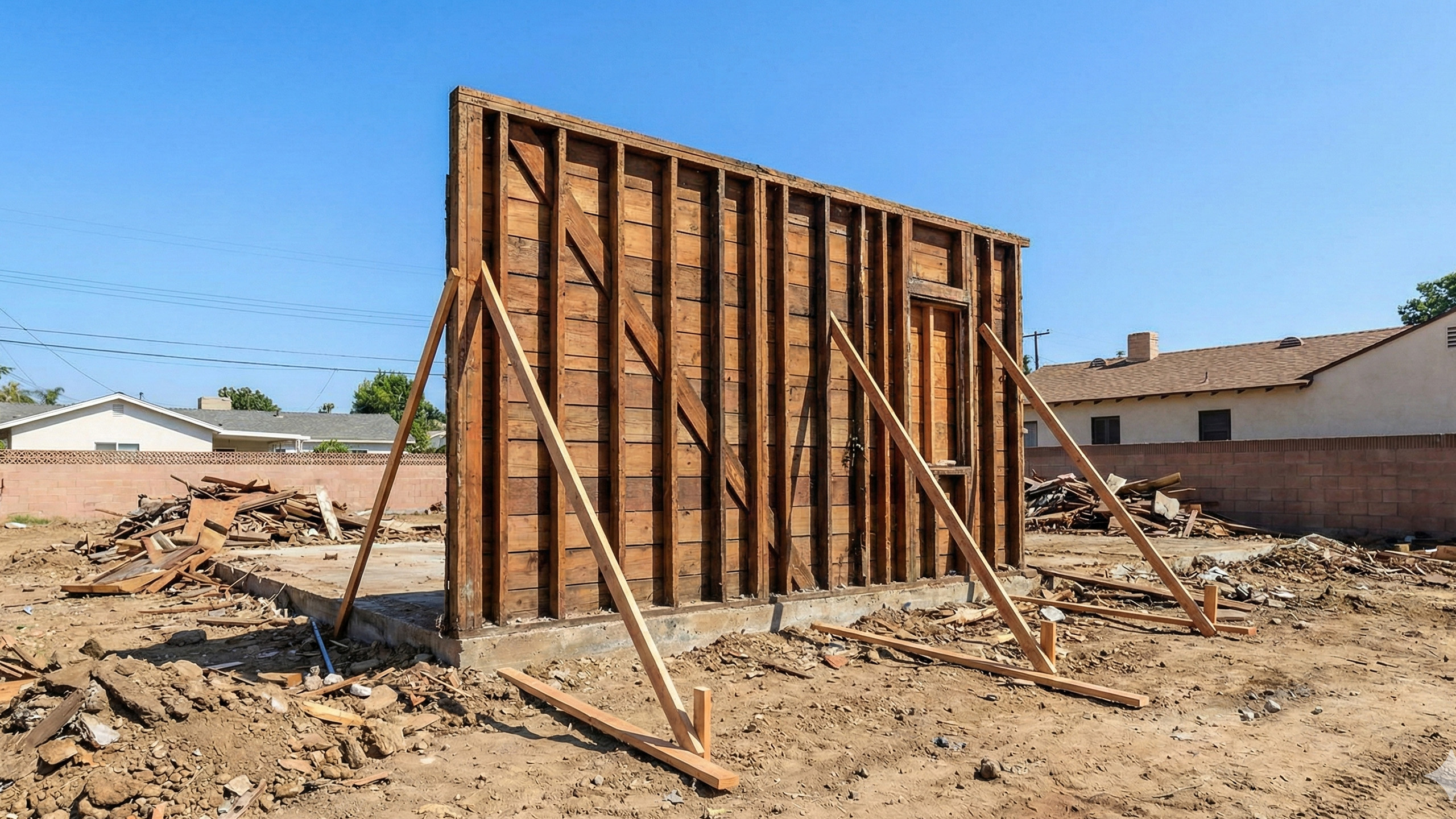Thinking about building your dream home in the heart of Los Angeles? Get ready for an exciting journey that requires a detailed plan and significant investment. As most of us don’t have nearly enough cash on hand to fund the entire build, outside financing can become an essential support to help manage those hefty project costs.
Luckily, there are various funding options available, each with its unique eligibility criteria and benefits. Armed with these insights on how to secure funding for your project, you can then concentrate on creating your dream house instead of worrying about financial issues.
Understanding Home Construction Funding
Each type of funding comes with its own set of rules, eligibility requirements, and potential advantages and disadvantages. So, let’s break it down and figure out what will work best for you and your project.

Home Equity Lines of Credit (HELOC)
A Home Equity Line of Credit (HELOC) offers a flexible way to access funds by using your home's equity as collateral. This credit option allows you to borrow up to a specified limit, which is typically based on a percentage of the amount of equity in your home.
Repayment works similar to a credit card, where you can borrow as much or as little as you need up to the limit, and interest is only paid on the amount used.
However, it's important to note that using your home as collateral means that if you fail to make payments, you could potentially lose your home through foreclosure.
Pros:
- Borrow as expenses come up
- Can be used for more than just construction if you secure it early enough
- Often lower than credit cards or personal loans
- Issuing payments to your contractor and vendors is fast and easy
- Interest may be tax-deductible for home improvements
- No need for additional inspections
- Faster overall timelines than with construction loans
Cons:
- Rates can increase over time
- Defaulting can lead to losing your home
- Easy access might lead to unnecessary debt
Construction Loans
Construction loans, such as combination loans like Construction-to-Permanent Loans and Stand-Alone Construction Loans, finance your project's construction. Ideal for those with substantial home equity or plans to sell their current residence once the new one is ready, these loans require full repayment upon project completion. They also lack the legal and financial protections of traditional loans.
Further Requirements
In addition to fulfilling the previously mentioned criteria, in the case of Construction Loans, lenders will also need the following details to comprehend your project and assess potential hazards:
- Thorough assessment of your property's potential post-construction value
- Detailed construction plans, including schedules and financial outlines
- Proof of land ownership where the construction will take place
Note: Each lender may have unique requirements, so doing your research before applying for home construction funding is essential.
Pros:
- Customizable to fit specific building projects
- May offer interest-only payments during construction phase
Cons:
- Requires substantial home equity or asset collateral
- Full repayment needed upon project completion
- Requires multiple inspections by the bank during construction which can significantly slow your project down
- May limit the number of draws you can request, so your contractor needs to agree to take on more of the financial burden for the project between payments
VA Loans, backed by the U.S. Department of Veterans Affairs (VA), cater to veterans, active-duty military personnel, and sometimes surviving partners. These loans feature no down payment requirements and competitive interest rates, but have specific eligibility criteria and may include costs like a VA funding fee.
Pros:
- No down payment required
- No mortgage insurance
- Lower interest rates and fees
Cons:
- Funding fee required
- Property restrictions
- Less equity to start
Regardless of the type of loan you’ve chosen, once the building process is complete, it's good to look into refinancing options. If market rates have gone down since you got your original construction loan, you could reduce your monthly payments and overall interest costs. If your credit score has improved, you might get better loan terms because it shows you're financially responsible. Having equity in a finished home will also reduce the risk for lenders, which could help you get even better interest rates.
Cash on Hand or Friends and Family Loans use available cash reserves or funds from personal circles instead of traditional loans. This method bypasses traditional lending institutions and their requirements, offering flexible repayment terms. However, borrowing from friends or family can strain personal relationships due to the lack of formal agreements.
Pros:
- Bypasses traditional lending institutions, which could lead to faster funding
- Flexible interest rates
- Flexible repayment terms
Cons:
- Potential strain on personal relationships
- Lack of formal agreements can lead to misunderstandings
- Can be difficult to manage if your project goes over budget
- May lead to delays in construction with additional parties reviewing billing and issuing payments

Do You Also Need to Finance the Purchase of Land for Your New Home?
When considering the land purchase aspect of a new build, you should note that securing funding for land is different from construction financing. A Land Loan is a great option to look into.
Land Loans are specifically designed for financing the purchase of land prior to starting construction. These loans can be a practical choice for those who have found their ideal piece of land but aren't ready to build immediately. It's important to note that land loans often come with higher interest rates and require a larger down payment compared to typical home mortgages.
Key Considerations When Financing Land
Securing funding for land purchases and construction projects requires strategic planning while also understanding various influencing factors to ensure investment sustainability and profitability. Some key things to consider include zoning and land-use restrictions, potential property value appreciation, environmental assessments and geotechnical surveys, which greatly impact project feasibility and return on investment.

Home Construction Funding: Eligibility and Necessary Requirements
It’s good to be aware of the requirements and eligibility criteria you need to meet when looking to obtain funding. Certain standards are set by lenders, which you must adhere to in order to qualify for construction loans. So before running out to the nearest lender to apply for a loan let’s see if you’re checking all the boxes:
Strong Credit History
A strong credit history is generally a fundamental necessity as lenders will perceive your credit score as an indication of your financial responsibility. This goes without saying but having a superior credit score greatly enhances your likelihood of loan approval and assists in obtaining favorable loan conditions.
Consistent Income
Demonstrating that you have a dependable income stream to repay the loan is also required. This could involve presenting your pay stubs, tax documents, and details about your current employer or employment status, among the long list of supporting information.
Initial Payment
When you apply for a loan, it's common for lenders to ask for a significant upfront payment. This payment is usually around 20% of the total project cost for Construction Loans. Its purpose is to protect the lender in case you're unable to repay the borrowed amount.
However, if you opt for a HELOC, you won't need to make this initial payment. Unlike Construction Loans, HELOCs don't require any plans or assessments of the property's value after construction. This means that you could even use your HELOC to fund initial architectural costs.

Finding the Right Lender in Los Angeles for Your Construction Funding
So, now that you understand the different funding options available to you, how do you go about selecting the right lender for you and your project?
For a strategic approach, leaning towards reliable lenders, with whom you may already have a financial history is a good place to start. Consider leveraging professional recommendations from reputable sources and don't forget about comparing loans on sites like Bankrate.com, which offer quick loan comparisons and ratings.
No matter what type of construction funding you secure, it's wise to incorporate a safety net—typically 10-15% of your total budget—for unforeseen expenses. Modifying your schedule to be adaptable and realistic can also help address unforeseen problems that could impact the distribution of funds. Remember, keeping a clear channel of communication with your builder ensures timely updates on any changes to the original construction budget and timing for loan draws.

Overcoming Funding Obstacles
Securing funds for building your new home can come with challenges such as construction delays and fluctuating construction costs, which can affect the affordability of your project. On top of that, high interest rates have been all over the media and have affected project costs. However, there are measures you can take to prepare for these potential hurdles:
Handling Interest Rate Variations
Interest rates may change over your construction period, impacting your loan's total cost. To manage this:
Look Into Rate Lock: If you’re able to secure a great rate, think about fixing your interest rate at loan application time to protect against future rate hikes. That said, current interest rates remain high at the moment, so it’s best to talk with your financial adviser about the best approach!
Track Market Rates: Keep up-to-date on current interest rate trends. If possible, delay your application if rates are too high and fund your build with cash on hand until rates come down.
Let’s Go!
By learning about the different construction funding options, criteria, and local resources, you can make taking the first step in your journey less intimidating. However, it's crucial to approach this process with care and meticulous planning to ensure success. Understanding the cost of your project before deciding on funding is essential and Letter Four's Action Plans are made with this in mind.
Are you ready to take action and secure the funding needed to turn your dream home into a reality? Get in touch with Letter Four today!






.svg)























.png)